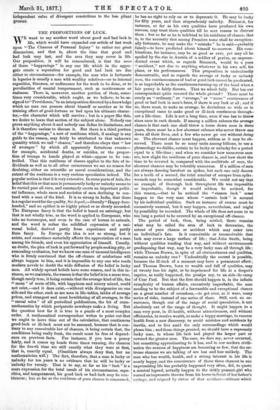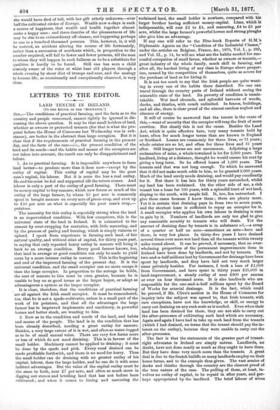THE PROPORTIONS. OF LUCK.
WE want to say another word about good and bad luck in life, which would have expanded our article of last week upon " The Chances of Personal Injury " to rather too great dimensions, and that is, about the time that good and bad luck may last, and the area they may cover in life. Our proposition, it will be remembered, is that the mass of those "happenings " in any one life which in the aggre- gate create a reputation for good and bad luck are due either to circumstances—for example, the man who is fortunate in legacies is usually a man with wealthy relatives—or to internal capacities, fitnesses, or unfitnesses for the work to be done, or to peculiarities of mental temperament, such as cautiousness or rashness. There is, moreover, another portion of them, some- times very considerable, which ought, as we believe, to be as- signed to " Providence,"to an interposition directed by a knowledge which no man can possess about himself or another as to the training effect, of good-fortune or bad upon his ultimate charac- ter,—the character which will survive ; but in a paper like this, we desire to leave that section of the subjeot alone. Nobody can prove anything about it and nobody can define its limitations, and it is therefore useless to discuss it. But there is a third portion of the " happenings," a sort of residuum which, if analogy is any guide to the reason, may fairly be attributed to that unknown quantity which we call " chance," and therefore obeys that " law of averages " by which all apparently fortuitous events— for example, accidental deaths, or suicides, or the propor- tion of trumps to hands played at whist—appear to be con- trolled. That this residuum of chance applies to the fate of in- dividuals as well as to all other occurrences we see no reason for doubting,. either on scientific or moral considerations, and the extent of the residuum is a very curious speculation indeed. The popular notion is that it is very extensive. In some parts of Asia, the belief that this or that man is permanently lucky or unlucky seems to be rooted past all cure, and constantly exerts an important politi- cal influence, whole races and societies of men declining to con- tend with a man of the kind. It is so strong in India, that there ilia regular word for the quality, S'ot-kopah,--literally " Happy-fore- headed," and no epithet is so highly prized or so slowly accorded. The European fancy is that the belief is based on astrology, but that is not wholly true, as the word is applied to Europeans, who take no horoscopes, and even in the case of horses to animals, and the word is rather the solidified expression of a uni- versal belief, derived partly from experience and partly from fancy. In Europe the idea is not so strong, but it exists, and sometimes materially affects the appreciation of a man among his friends, and even his appreciation of himself. Usually, no doubt, the plea of luck is put forward by people seeking pity, or concealing exultation, but we know one man of unusual intelligence who is firmly convinced that the off-chance of misfortune will always happen to him, and it is impossible to any one who reads modern novels to doubt the wide diffusion of the belief in lucky men. All widely-spread beliefs have some reason, and in this in- stance, as we maintain, the reason is that the belief is in a sense true, though rarely true, it being certain that the average kind of life, the "mean " of sorts of life, with happiness and misery mixed, ootdd not exist,—and it does exist,—without wide divergencies on one side and the other, such as are seen in life-tables, tables of average prices, and strangest and most bewildering of all averages, in the " casual sales " of all periodical publications, the bit of cram- mathematics by which peripatetic newsboys make a living. But the question how far it is true is a puzzle of a most complex order. A mathematical correspondent writes to point ont tbat we ought to leave time out of the calculation, that continuous good-luck or ill-luck must not be assumed, because that is con- trary to any conceivable law of chances, it being certain that, the conditions being really fresh, the result must be free of depend- ence on previous facts. For instance, if you toss a penny fairly, and it comes up heads three times mining, the chances for the fourth time are still exactly what they were at first, that is, exactly equal, (Gamblers always deny that, but no mathematician will.) The fact, therefore, that a man is lucky or unlucky for ten years is no evidence that he will be lucky or unlucky for twenty. That is to say, so far as his " luck " is a mere expression for the total result of his circumstances, capa,. cities, and temperament, his good -luck or bad-luck may be con- tinuous; but so far as the residuum of pure chance is concerned, he has no right to rely on or to deprecate it. He may be lucky for fifty years, and then stupendously unlucky. Bismarck, for instance, so far as his own qualities have produced his own success, may trust those qualities till he sees reason to distrust them ; but so far as he is indebted to his residuum of chance, that is, to the necessity that among Premiers some shall be exception- ally fortunate, he may make the " mistake " he is said—probably falsely—to have predicted about himself to-morrow. His com- binations, for instance, may be as good as ever, yet may all be spoiled by the rise in Austria of a soldier of genius, an unprece- dented event which, as regards Bismarck, would be a pure " accident," not due to anything whatever in his own self, his plans, or his performances. This proposition is undoubtedly demonstrable, and as regards the average of lucky or unlucky men, the continuousness of bad or good luck cannot be predicated, is as improbable as the continuous turning-up of the head when a fair penny is fairly thrown. That we admit fully. But has our correspondent quite covered the whole ground ? There must be surely an " ordinary," or " average," or " mean" continuance of good or bad luck in men's fates, if there is any luck at all ; and if so, there must, to make an average, be deviations so wide as in exceptional cases to make good or ill-luck continuous through- out a life-time. Life is not a long time, even if one has to threw sixes once in each decade. If among a million cabmen the average chance is that each one shall throw a horse down once in three years, there must be a few aberrant cabmen who never throw one down all their lives, and a few who never go out without doing so. The aberrant chance must happen, seldom as it may be ob- served. There must be so many units among- billions, to use a phraseology we dislike, certain to be lucky or unlucky for a period equal to a life-time ; and when we consider how numerous men are, how slight the residuum of pure chance is, and how short the time to be covered is, compared with the multitude of men, the aberrant chances may be tolerably numerous. If a million of men are always dancing barefoot on spikes, but each one only dances for a tenth of a second, the total number of escapes from spike. wounds may be somewhat considerable. We could not say that an example of thorough luck throughout life was impossible or improbable, though it would seldom be noticed, for this reason,—that to be noticed the "chance luck" mast happen to the very man whose " certain luck " is secured by his individual qualities. Such an instance of course must be excessively unusual, but it may happen, nevertheless, and might by possibility be recorded. The whole of life does not seem to us too long a period to be covered by an exceptional off-chance.
The period of lack, then, being settled, there remains what may be called the area of luck to determine, the extent of pure chance or accident which may enter into an individual's fate. Is it conceivable or inconceivable that luck may cover a large surface of life ; that John Smith, being without qualities tending that way, and without environments predisposing that way, may be a very lucky man all through life ; while Thomas Brown, in spite of all circumstances and qualities, remains an unlucky one ? Undoubtedly the second is possible, because the ill-luck of a moment may have a permanent effect ; and Thomas Brown, born to wealth and full of qualities, may at twenty lose his sight, or be imprisoned for life at a despot's caprice, as really happened, the gossips say-, to an aide-de-camp of Czar Paul. But that the first should happen is, in the infinite complexity of human affairs, excessively improbable, the man needing to be the subject of a favourable and exceptional chance on a great number of occasions,—to get over, as it were, many series of risks, instead of one series of them. Still, such an 00- currence, though out of the range of social speculation, is not absolutely out of the range of thought. It might happen to a man very poor, in ill-health, without attractiveness, and without efficiencies, to receive wealth, to make a happy marriage, to recover health from a new discovery, to avoid mistakes and accidents by inertia, and to live amid the only surroundings which would please him ; and those things granted, we should have a supremely lucky man, in whose life luck had played the larger part or covered the greater area. The case, we dare say, never occurred, but something approximating to it has, and in our modern civili- sation the sources of happiness are becoming so few, that the ex- treme chances we are talking of are less and less unlikely. The man who has wealth, health, and a strong interest in his life is nearly happy, and the concurrence of those three chances in one unpromising life has probably happened very often, did, to quote a musical legend, actually happen to the sickly peasant-girl who nursed an impresario thrown from his horse in front of her father's cottage, and reigned by virtue of that accident—without which
she would have died of toil, with her gift utterly anknown—oier half the cultivated circles of Europe. Wealth now-a-days is such a source of happiness, that wealth and health together almost make a happy man ; and three-fourths of the pleasantness of life may be due to an extraordinary off-chance, not happening perhaps to one in a hundred thousand persons. This, however, is, it will be noticed, an accident altering the course of life fortunately, rather than a succession of accidents which, in proportion to the number required, will fall to fewer and fewer persons, till the man to whom they will happen in such fullness as to be a substitute for qualities is hardly to be found. Still one has seen a child scarcely aware of the rules at whist beat old players through a whole evening by sheer dint of trumps and aces, and the analogy to human life, as occasionally and exceptionally observed, is very close.



































 Previous page
Previous page